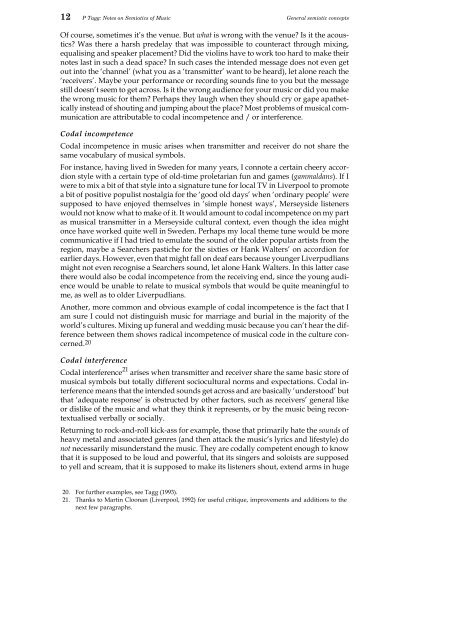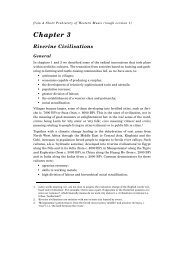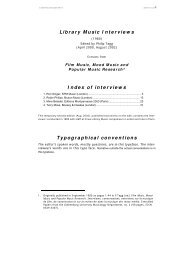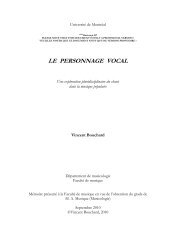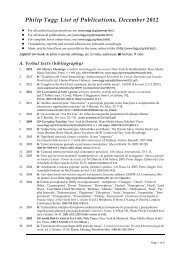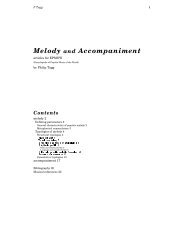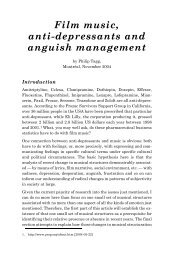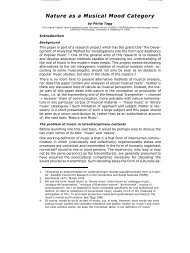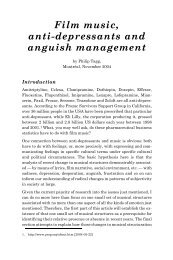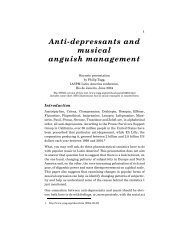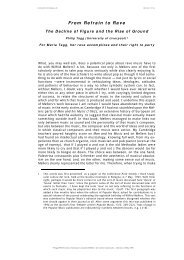Introductory notes to the Semiotics of Music - Philip Tagg's home page
Introductory notes to the Semiotics of Music - Philip Tagg's home page
Introductory notes to the Semiotics of Music - Philip Tagg's home page
Create successful ePaper yourself
Turn your PDF publications into a flip-book with our unique Google optimized e-Paper software.
12 P Tagg: Notes on <strong>Semiotics</strong> <strong>of</strong> <strong>Music</strong> General semiotic concepts<br />
Of course, sometimes it’s <strong>the</strong> venue. But what is wrong with <strong>the</strong> venue? Is it <strong>the</strong> acoustics?<br />
Was <strong>the</strong>re a harsh predelay that was impossible <strong>to</strong> counteract through mixing,<br />
equalising and speaker placement? Did <strong>the</strong> violins have <strong>to</strong> work <strong>to</strong>o hard <strong>to</strong> make <strong>the</strong>ir<br />
<strong>notes</strong> last in such a dead space? In such cases <strong>the</strong> intended message does not even get<br />
out in<strong>to</strong> <strong>the</strong> ‘channel’ (what you as a ‘transmitter’ want <strong>to</strong> be heard), let alone reach <strong>the</strong><br />
‘receivers’. Maybe your performance or recording sounds fine <strong>to</strong> you but <strong>the</strong> message<br />
still doesn’t seem <strong>to</strong> get across. Is it <strong>the</strong> wrong audience for your music or did you make<br />
<strong>the</strong> wrong music for <strong>the</strong>m? Perhaps <strong>the</strong>y laugh when <strong>the</strong>y should cry or gape apa<strong>the</strong>tically<br />
instead <strong>of</strong> shouting and jumping about <strong>the</strong> place? Most problems <strong>of</strong> musical communication<br />
are attributable <strong>to</strong> codal incompetence and / or interference.<br />
Codal incompetence<br />
Codal incompetence in music arises when transmitter and receiver do not share <strong>the</strong><br />
same vocabulary <strong>of</strong> musical symbols.<br />
For instance, having lived in Sweden for many years, I connote a certain cheery accordion<br />
style with a certain type <strong>of</strong> old-time proletarian fun and games (gammaldans). If I<br />
were <strong>to</strong> mix a bit <strong>of</strong> that style in<strong>to</strong> a signature tune for local TV in Liverpool <strong>to</strong> promote<br />
a bit <strong>of</strong> positive populist nostalgia for <strong>the</strong> ‘good old days’ when ‘ordinary people’ were<br />
supposed <strong>to</strong> have enjoyed <strong>the</strong>mselves in ‘simple honest ways’, Merseyside listeners<br />
would not know what <strong>to</strong> make <strong>of</strong> it. It would amount <strong>to</strong> codal incompetence on my part<br />
as musical transmitter in a Merseyside cultural context, even though <strong>the</strong> idea might<br />
once have worked quite well in Sweden. Perhaps my local <strong>the</strong>me tune would be more<br />
communicative if I had tried <strong>to</strong> emulate <strong>the</strong> sound <strong>of</strong> <strong>the</strong> older popular artists from <strong>the</strong><br />
region, maybe a Searchers pastiche for <strong>the</strong> sixties or Hank Walters’ on accordion for<br />
earlier days. However, even that might fall on deaf ears because younger Liverpudlians<br />
might not even recognise a Searchers sound, let alone Hank Walters. In this latter case<br />
<strong>the</strong>re would also be codal incompetence from <strong>the</strong> receiving end, since <strong>the</strong> young audience<br />
would be unable <strong>to</strong> relate <strong>to</strong> musical symbols that would be quite meaningful <strong>to</strong><br />
me, as well as <strong>to</strong> older Liverpudlians.<br />
Ano<strong>the</strong>r, more common and obvious example <strong>of</strong> codal incompetence is <strong>the</strong> fact that I<br />
am sure I could not distinguish music for marriage and burial in <strong>the</strong> majority <strong>of</strong> <strong>the</strong><br />
world’s cultures. Mixing up funeral and wedding music because you can’t hear <strong>the</strong> difference<br />
between <strong>the</strong>m shows radical incompetence <strong>of</strong> musical code in <strong>the</strong> culture concerned.<br />
20<br />
Codal interference<br />
Codal interference 21 arises when transmitter and receiver share <strong>the</strong> same basic s<strong>to</strong>re <strong>of</strong><br />
musical symbols but <strong>to</strong>tally different sociocultural norms and expectations. Codal interference<br />
means that <strong>the</strong> intended sounds get across and are basically ‘unders<strong>to</strong>od’ but<br />
that ‘adequate response’ is obstructed by o<strong>the</strong>r fac<strong>to</strong>rs, such as receivers’ general like<br />
or dislike <strong>of</strong> <strong>the</strong> music and what <strong>the</strong>y think it represents, or by <strong>the</strong> music being recontextualised<br />
verbally or socially.<br />
Returning <strong>to</strong> rock-and-roll kick-ass for example, those that primarily hate <strong>the</strong> sounds <strong>of</strong><br />
heavy metal and associated genres (and <strong>the</strong>n attack <strong>the</strong> music’s lyrics and lifestyle) do<br />
not necessarily misunderstand <strong>the</strong> music. They are codally competent enough <strong>to</strong> know<br />
that it is supposed <strong>to</strong> be loud and powerful, that its singers and soloists are supposed<br />
<strong>to</strong> yell and scream, that it is supposed <strong>to</strong> make its listeners shout, extend arms in huge<br />
20. For fur<strong>the</strong>r examples, see Tagg (1993).<br />
21. Thanks <strong>to</strong> Martin Cloonan (Liverpool, 1992) for useful critique, improvements and additions <strong>to</strong> <strong>the</strong><br />
next few paragraphs.


